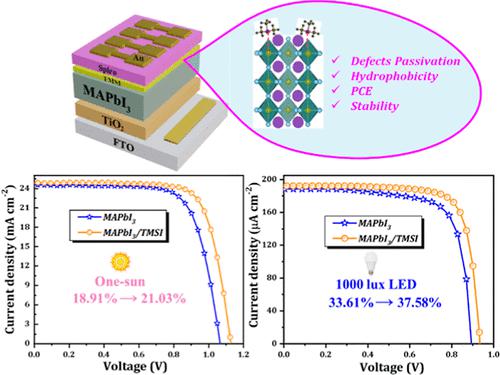当前位置:
X-MOL 学术
›
ACS Appl. Mater. Interfaces
›
论文详情
Our official English website, www.x-mol.net, welcomes your
feedback! (Note: you will need to create a separate account there.)
Surface Reconstruction with Aprotic Trimethylsulfonium Iodide for Efficient and Stable Perovskite Solar Cells
ACS Applied Materials & Interfaces ( IF 8.3 ) Pub Date : 2024-01-09 , DOI: 10.1021/acsami.3c15520 Sanjay Sandhu 1 , Md Mahbubur Rahman 2 , Bommaramoni Yadagiri 1 , Ashok Kumar Kaliamurthy 1 , Appiagyei Ewusi Mensah 1 , Farihatun Jannat Lima 1 , Saif Ahmed 1 , Jongdeok Park 1 , Manish Kumar 3 , Jae-Joon Lee 1
ACS Applied Materials & Interfaces ( IF 8.3 ) Pub Date : 2024-01-09 , DOI: 10.1021/acsami.3c15520 Sanjay Sandhu 1 , Md Mahbubur Rahman 2 , Bommaramoni Yadagiri 1 , Ashok Kumar Kaliamurthy 1 , Appiagyei Ewusi Mensah 1 , Farihatun Jannat Lima 1 , Saif Ahmed 1 , Jongdeok Park 1 , Manish Kumar 3 , Jae-Joon Lee 1
Affiliation

|
Organic ammonium salts are widely used for surface passivation to enhance the photovoltaic (PV) performance and stability of perovskite solar cells (PSCs). However, the protic nature of ammonium units results in the quick degradation of perovskites due to the hydrogen bonding interaction with water molecules. Recently, organo-sulfur compounds have attracted growing interest as passivation layers on three-dimensional perovskites due to their moisture-resistive behavior. Herein, trimethylsulfonium iodide (TMSI), an aprotic S-based organic compound, is employed for surface modification of methylammonium lead iodide-based PSCs to impede moisture penetration, improve charge transfer, and passivate surface defects. The TMSI effectively passivates uncoordinated Pb through Pb···S interactions, and the optimized PSC exhibits a power conversion efficiency (PCE) of 21.03% with an open-circuit voltage of ca. 1.13 V under one-sun illumination, while it reached up to 37.58 and 37.69% under low-intensity indoor illuminations, 1000 and 2000 lx with LED 5000 K, respectively. TMSI-treated cells display enhanced device stability by retaining 92.7% of their initial PCE after 50 days of storage in ambient conditions. This study provides a novel and effective surface reconstruction strategy with aprotic materials to improve PV performance and device stability in PSCs.
中文翻译:

用非质子三甲基碘化锍表面重建实现高效稳定的钙钛矿太阳能电池
有机铵盐广泛用于表面钝化,以提高钙钛矿太阳能电池(PSC)的光伏(PV)性能和稳定性。然而,由于与水分子的氢键相互作用,铵单元的质子性质导致钙钛矿快速降解。最近,有机硫化合物由于其防潮性能而作为三维钙钛矿上的钝化层引起了越来越多的兴趣。在此,三甲基碘化锍(TMSI)是一种非质子性S基有机化合物,用于对甲基碘化铅基PSC进行表面改性,以阻止水分渗透,改善电荷转移并钝化表面缺陷。 TMSI通过Pb…S相互作用有效地钝化不配位的Pb,优化后的PSC的功率转换效率(PCE)为21.03%,开路电压约为15.05%。在一太阳光照下为 1.13 V,而在 LED 5000 K 的低强度室内照明(1000 和 2000 lx)下分别达到 37.58 和 37.69%。经过 TMSI 处理的电池在环境条件下储存 50 天后保留了 92.7% 的初始 PCE,显示出增强的设备稳定性。这项研究提供了一种新颖有效的非质子材料表面重构策略,以提高 PSC 中的光伏性能和器件稳定性。
更新日期:2024-01-09
中文翻译:

用非质子三甲基碘化锍表面重建实现高效稳定的钙钛矿太阳能电池
有机铵盐广泛用于表面钝化,以提高钙钛矿太阳能电池(PSC)的光伏(PV)性能和稳定性。然而,由于与水分子的氢键相互作用,铵单元的质子性质导致钙钛矿快速降解。最近,有机硫化合物由于其防潮性能而作为三维钙钛矿上的钝化层引起了越来越多的兴趣。在此,三甲基碘化锍(TMSI)是一种非质子性S基有机化合物,用于对甲基碘化铅基PSC进行表面改性,以阻止水分渗透,改善电荷转移并钝化表面缺陷。 TMSI通过Pb…S相互作用有效地钝化不配位的Pb,优化后的PSC的功率转换效率(PCE)为21.03%,开路电压约为15.05%。在一太阳光照下为 1.13 V,而在 LED 5000 K 的低强度室内照明(1000 和 2000 lx)下分别达到 37.58 和 37.69%。经过 TMSI 处理的电池在环境条件下储存 50 天后保留了 92.7% 的初始 PCE,显示出增强的设备稳定性。这项研究提供了一种新颖有效的非质子材料表面重构策略,以提高 PSC 中的光伏性能和器件稳定性。


















































 京公网安备 11010802027423号
京公网安备 11010802027423号